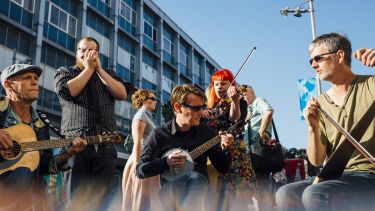Originally published in the Sheffield Telegraph, 2nd February 2021
Sheffield is a city of makers of musicians, writers, brewers, artists and artisans. A city where great art and culture is created, consumed and appreciated.
It is also a city of producers, stage managers, costume and prop makers, sound engineers, photographers, lighting technicians - the list is endless. They work across the stage, behind the stage, set up the stage, programme the stage and then clear the stage.
They put up the lighting rigs, dim the lights and put the spotlight on the performer, artist or cultural activity that you come to view.
They set the scene for the cultural activity such as music, art, performance, theatre, stand-up comedy, dance – be it on a stage, in a field, on Spotify, Zoom, Apple or YouTube.
They produce, programme, organise, deliver and have enabled us the audience to continue to enjoy all that culture and art can bring to our lives despite the barriers imposed by lockdown. Some 67% of our theatrical workforce are freelancers with the outdoor events industry that covers our festivals posting an even higher figure.
For Sheffield’s cultural sectors to fully recover we need our fantastic freelance community there alongside us not lost to other sectors who will benefit from their skills and passion. Museums need artists and makers to bring purpose to the galleries that are currently empty, the theatres need writers, actors, producers and technicians to put on the show, the empty festival fields need programmers, musicians, sound engineers and stage crew to ensure the band plays on.
Professor Vanessa Toulmin
Director of City and Culture, University of Sheffield
Figures from national bodies estimate that over 15% of the UK workforce are self-employed and within the arts and culture sector in the Sheffield City Region it is estimated that over 21,000 people are registered as being freelance operators in the creative industries.
The impact of the Covid-19 pandemic on all aspects of life and society will be manifest for years to come and many amazing groups in the city are dealing with the day-to-day impact this is having on some of the most disadvantaged groups in our society.
Government funds have been made available to help some venues and organisations bridge the gap between the economic ruin many of them were facing and giving them a life jacket so they were waving not drowning. But what of the freelancers that make the art, produce the art and enable us the audience to experience it?
A survey of freelance workers in Sheffield’s arts and culture sector conducted by the University of Sheffield highlights the huge impact the pandemic has had on those working independently in the cultural industries.
Evidence suggests that freelance workers have been largely ineligible for grant support schemes with many respondents expressing concern about the dramatic decline in work and loss of income from royalties, commissions, revenue and ticket sales because of the pandemic.
My colleague Dr Sarah Price has recently published the interim findings of this ongoing research in order to highlight the issues they are facing.
The freelancers in the arts and creative economy are the very essence of what makes Sheffield a rich vibrant and cultural city and the findings are bleak. 75% of respondents had found that the availability of work has “decreased dramatically” since Covid-19 with the average respondent reporting a loss of 63% of their income with turnover dropping from £25k in 2019 to just £9.5k in 2020.
Professor Vanessa Toulmin
Director of City and Culture, University of Sheffield
Many were struggling to see a future in the industry with 61% considering or actively pursuing work outside the creative sector. Mental wellbeing had worsened with the stress of unemployment and personal finances keeping many up at night.
In response to this, the cultural venues and organisations via the Culture Consortium have come together along with Sheffield City Council and both the University of Sheffield and Sheffield Hallam University to launch a fund that may help some of those that have slipped through the net.
We have done this as we realise that without the very network of artists and makers that bring vibrancy to our city we are facing a longer and more difficult recovery.
Before I became an academic, and even in my early days on the university ladder, I worked as a freelancer in Europe and the UK doing a range of activities and owe many of my life skills to those formative years.
The dedication, passion and seemingly endless levels of commitment to the task my colleagues faced inspired me then and continue to inspire me today. In my late 20s, I chose to pursue another path, but that was my choice and I have no regrets.
For the freelancers operating today, the choices are being taken away with nearly two-thirds of those surveyed actively seeking work outside the sectors they had been part of for many years.
This new fund is a small step in demonstrating the value they bring and their importance to the city. For further details on how to apply, see 'Funding for Freelance Art + Cultural Workers in Sheffield'.

